Childcare Module: Rights of the Child in Early Childhood Education
VerifiedAdded on 2021/04/24
|8
|1192
|110
Discussion Board Post
AI Summary
This assignment delves into the critical aspects of childcare, focusing on the rights of the child as outlined by the UNCRC. The discussion covers the importance of freedom of expression for children, emphasizing their right to be heard and participate in decision-making processes. It also examines the right to play as a fundamental aspect of a child's development, highlighting its role in fostering creativity, social skills, and overall well-being. The assignment explores how early childhood educators can support these rights, providing practical examples of practices within early childhood settings that promote play and ensure children's voices are valued. The student reflects on the educator's responsibility to provide a safe and stimulating environment that respects children's individual interests and cultural backgrounds, aligning with the principles of the Early Years Framework.
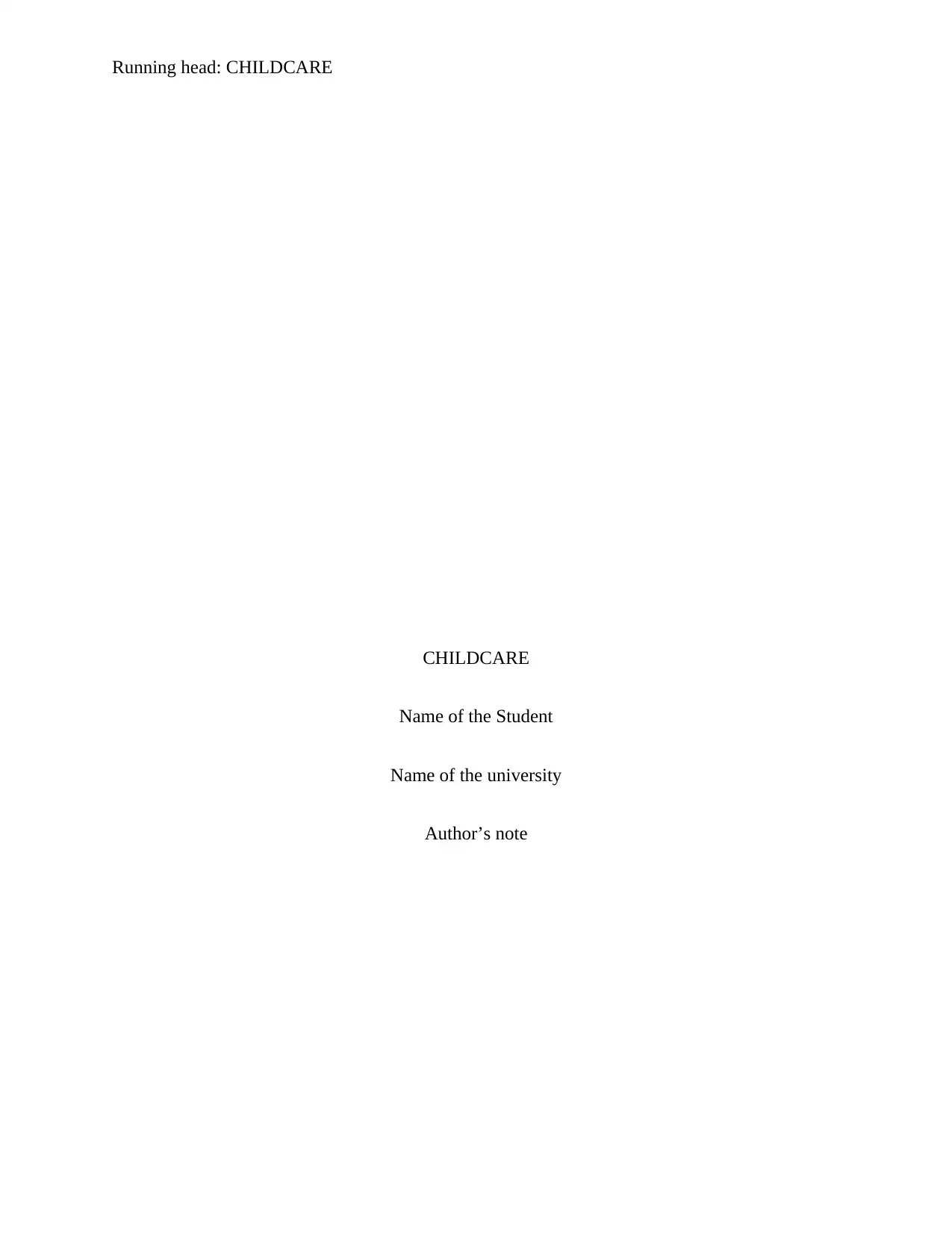
Running head: CHILDCARE
CHILDCARE
Name of the Student
Name of the university
Author’s note
CHILDCARE
Name of the Student
Name of the university
Author’s note
Paraphrase This Document
Need a fresh take? Get an instant paraphrase of this document with our AI Paraphraser
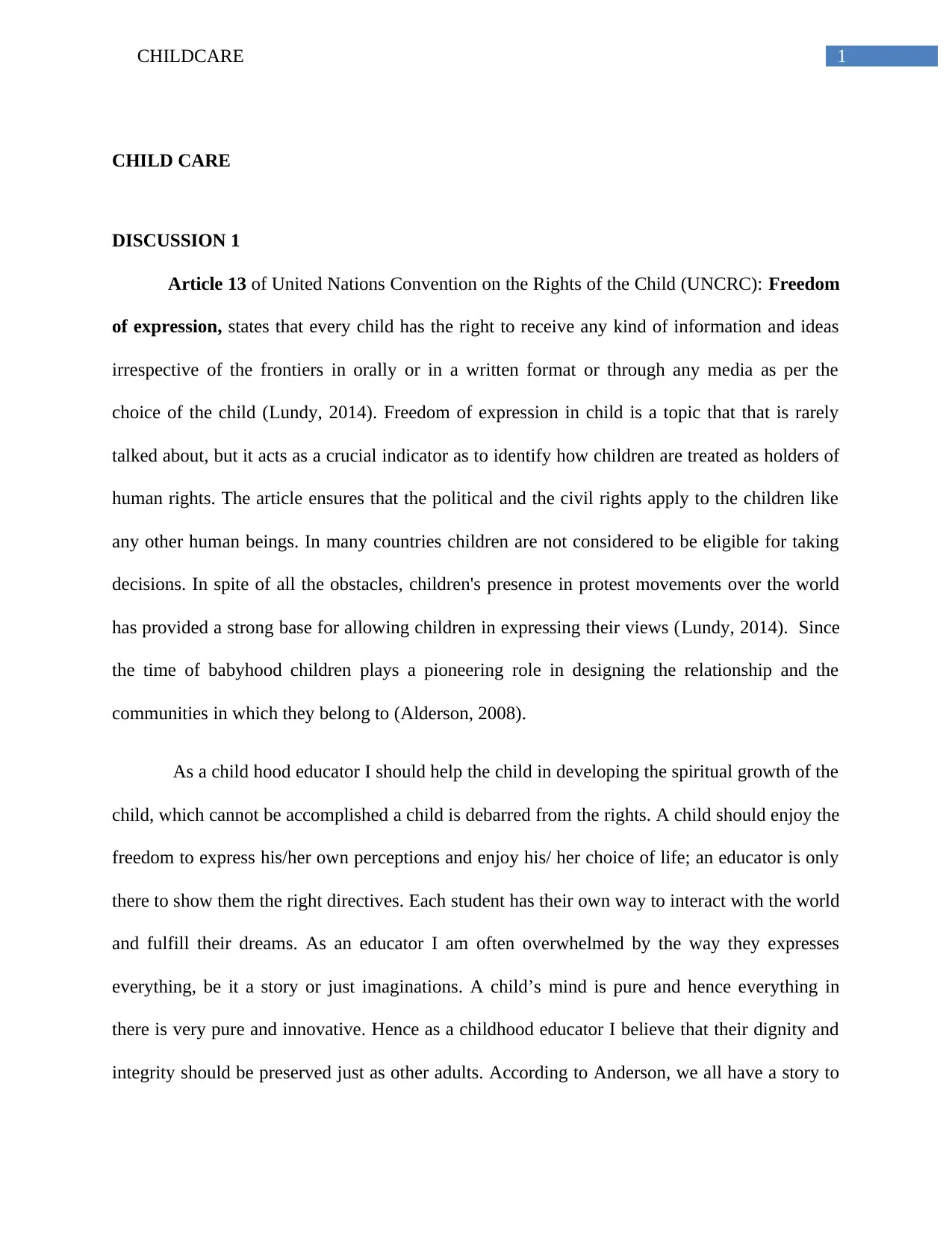
1CHILDCARE
CHILD CARE
DISCUSSION 1
Article 13 of United Nations Convention on the Rights of the Child (UNCRC): Freedom
of expression, states that every child has the right to receive any kind of information and ideas
irrespective of the frontiers in orally or in a written format or through any media as per the
choice of the child (Lundy, 2014). Freedom of expression in child is a topic that that is rarely
talked about, but it acts as a crucial indicator as to identify how children are treated as holders of
human rights. The article ensures that the political and the civil rights apply to the children like
any other human beings. In many countries children are not considered to be eligible for taking
decisions. In spite of all the obstacles, children's presence in protest movements over the world
has provided a strong base for allowing children in expressing their views (Lundy, 2014). Since
the time of babyhood children plays a pioneering role in designing the relationship and the
communities in which they belong to (Alderson, 2008).
As a child hood educator I should help the child in developing the spiritual growth of the
child, which cannot be accomplished a child is debarred from the rights. A child should enjoy the
freedom to express his/her own perceptions and enjoy his/ her choice of life; an educator is only
there to show them the right directives. Each student has their own way to interact with the world
and fulfill their dreams. As an educator I am often overwhelmed by the way they expresses
everything, be it a story or just imaginations. A child’s mind is pure and hence everything in
there is very pure and innovative. Hence as a childhood educator I believe that their dignity and
integrity should be preserved just as other adults. According to Anderson, we all have a story to
CHILD CARE
DISCUSSION 1
Article 13 of United Nations Convention on the Rights of the Child (UNCRC): Freedom
of expression, states that every child has the right to receive any kind of information and ideas
irrespective of the frontiers in orally or in a written format or through any media as per the
choice of the child (Lundy, 2014). Freedom of expression in child is a topic that that is rarely
talked about, but it acts as a crucial indicator as to identify how children are treated as holders of
human rights. The article ensures that the political and the civil rights apply to the children like
any other human beings. In many countries children are not considered to be eligible for taking
decisions. In spite of all the obstacles, children's presence in protest movements over the world
has provided a strong base for allowing children in expressing their views (Lundy, 2014). Since
the time of babyhood children plays a pioneering role in designing the relationship and the
communities in which they belong to (Alderson, 2008).
As a child hood educator I should help the child in developing the spiritual growth of the
child, which cannot be accomplished a child is debarred from the rights. A child should enjoy the
freedom to express his/her own perceptions and enjoy his/ her choice of life; an educator is only
there to show them the right directives. Each student has their own way to interact with the world
and fulfill their dreams. As an educator I am often overwhelmed by the way they expresses
everything, be it a story or just imaginations. A child’s mind is pure and hence everything in
there is very pure and innovative. Hence as a childhood educator I believe that their dignity and
integrity should be preserved just as other adults. According to Anderson, we all have a story to
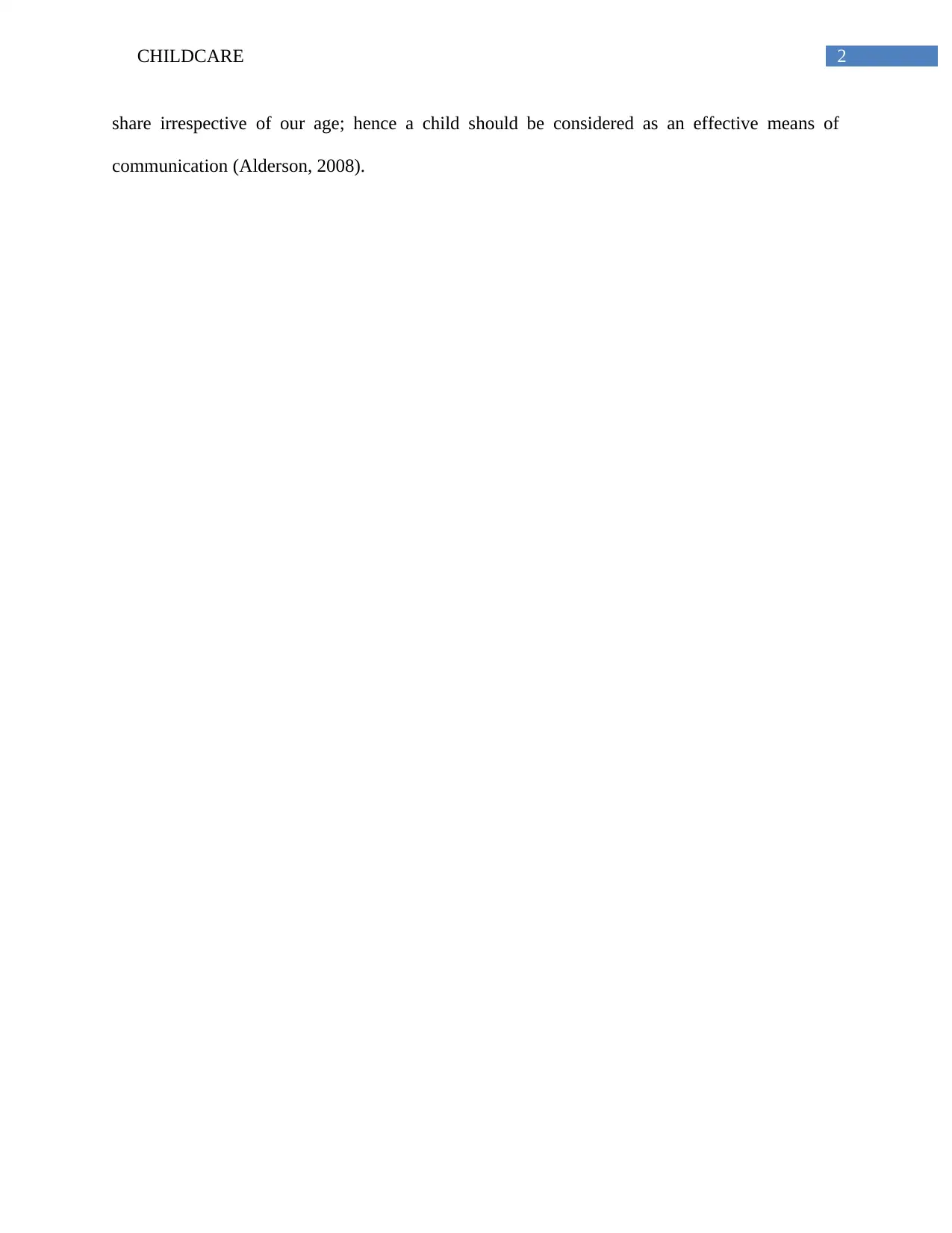
2CHILDCARE
share irrespective of our age; hence a child should be considered as an effective means of
communication (Alderson, 2008).
share irrespective of our age; hence a child should be considered as an effective means of
communication (Alderson, 2008).
⊘ This is a preview!⊘
Do you want full access?
Subscribe today to unlock all pages.

Trusted by 1+ million students worldwide
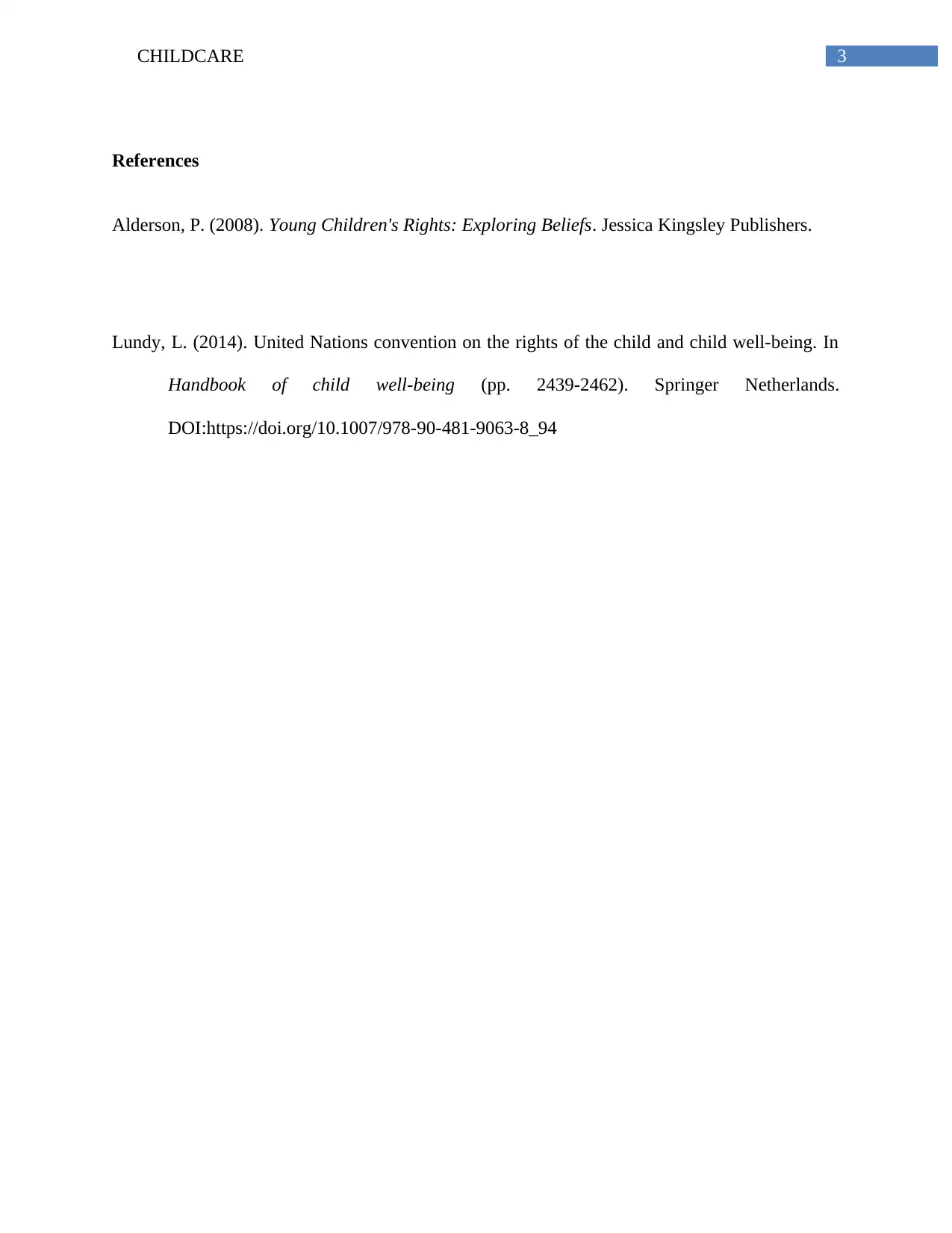
3CHILDCARE
References
Alderson, P. (2008). Young Children's Rights: Exploring Beliefs. Jessica Kingsley Publishers.
Lundy, L. (2014). United Nations convention on the rights of the child and child well-being. In
Handbook of child well-being (pp. 2439-2462). Springer Netherlands.
DOI:https://doi.org/10.1007/978-90-481-9063-8_94
References
Alderson, P. (2008). Young Children's Rights: Exploring Beliefs. Jessica Kingsley Publishers.
Lundy, L. (2014). United Nations convention on the rights of the child and child well-being. In
Handbook of child well-being (pp. 2439-2462). Springer Netherlands.
DOI:https://doi.org/10.1007/978-90-481-9063-8_94
Paraphrase This Document
Need a fresh take? Get an instant paraphrase of this document with our AI Paraphraser
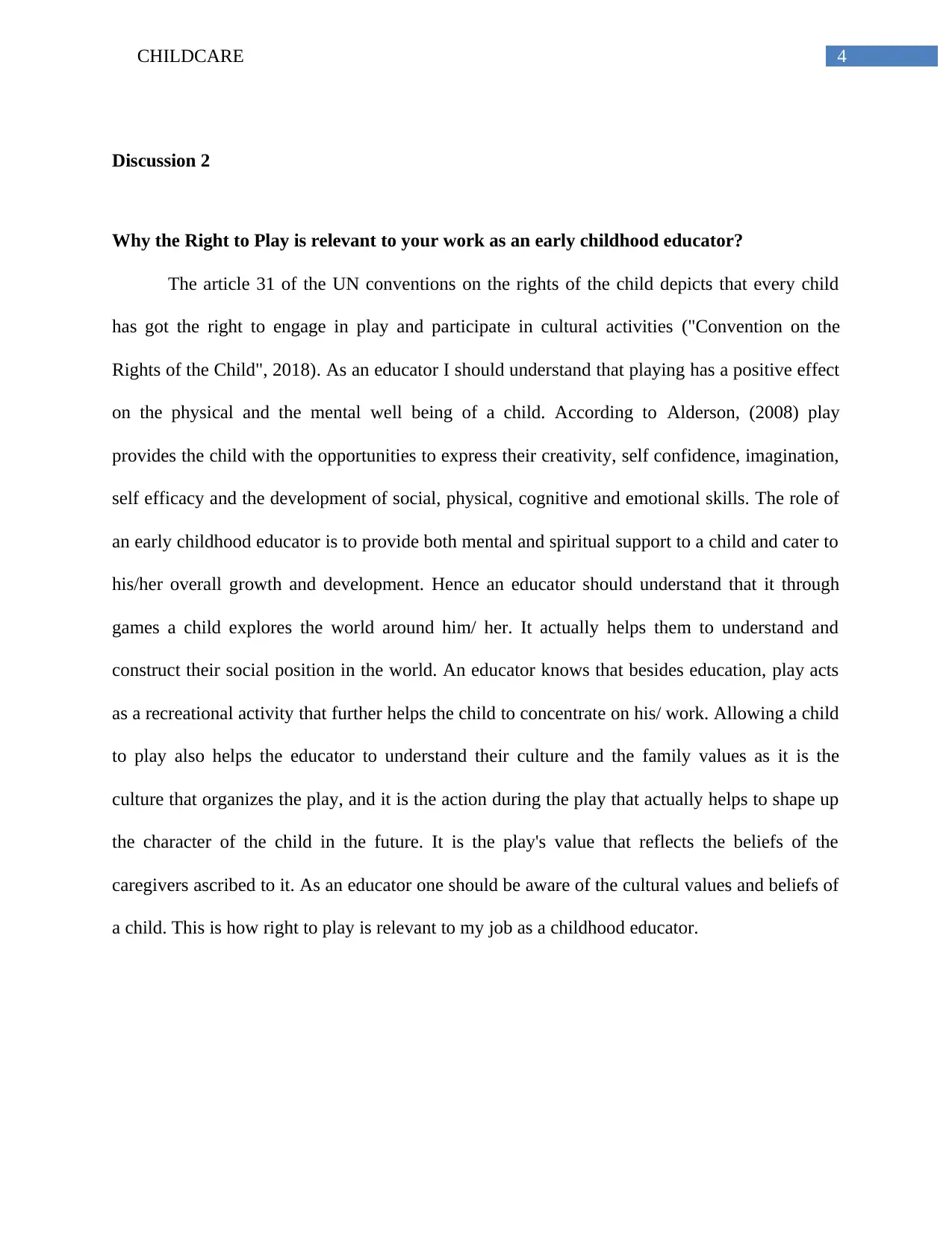
4CHILDCARE
Discussion 2
Why the Right to Play is relevant to your work as an early childhood educator?
The article 31 of the UN conventions on the rights of the child depicts that every child
has got the right to engage in play and participate in cultural activities ("Convention on the
Rights of the Child", 2018). As an educator I should understand that playing has a positive effect
on the physical and the mental well being of a child. According to Alderson, (2008) play
provides the child with the opportunities to express their creativity, self confidence, imagination,
self efficacy and the development of social, physical, cognitive and emotional skills. The role of
an early childhood educator is to provide both mental and spiritual support to a child and cater to
his/her overall growth and development. Hence an educator should understand that it through
games a child explores the world around him/ her. It actually helps them to understand and
construct their social position in the world. An educator knows that besides education, play acts
as a recreational activity that further helps the child to concentrate on his/ work. Allowing a child
to play also helps the educator to understand their culture and the family values as it is the
culture that organizes the play, and it is the action during the play that actually helps to shape up
the character of the child in the future. It is the play's value that reflects the beliefs of the
caregivers ascribed to it. As an educator one should be aware of the cultural values and beliefs of
a child. This is how right to play is relevant to my job as a childhood educator.
Discussion 2
Why the Right to Play is relevant to your work as an early childhood educator?
The article 31 of the UN conventions on the rights of the child depicts that every child
has got the right to engage in play and participate in cultural activities ("Convention on the
Rights of the Child", 2018). As an educator I should understand that playing has a positive effect
on the physical and the mental well being of a child. According to Alderson, (2008) play
provides the child with the opportunities to express their creativity, self confidence, imagination,
self efficacy and the development of social, physical, cognitive and emotional skills. The role of
an early childhood educator is to provide both mental and spiritual support to a child and cater to
his/her overall growth and development. Hence an educator should understand that it through
games a child explores the world around him/ her. It actually helps them to understand and
construct their social position in the world. An educator knows that besides education, play acts
as a recreational activity that further helps the child to concentrate on his/ work. Allowing a child
to play also helps the educator to understand their culture and the family values as it is the
culture that organizes the play, and it is the action during the play that actually helps to shape up
the character of the child in the future. It is the play's value that reflects the beliefs of the
caregivers ascribed to it. As an educator one should be aware of the cultural values and beliefs of
a child. This is how right to play is relevant to my job as a childhood educator.
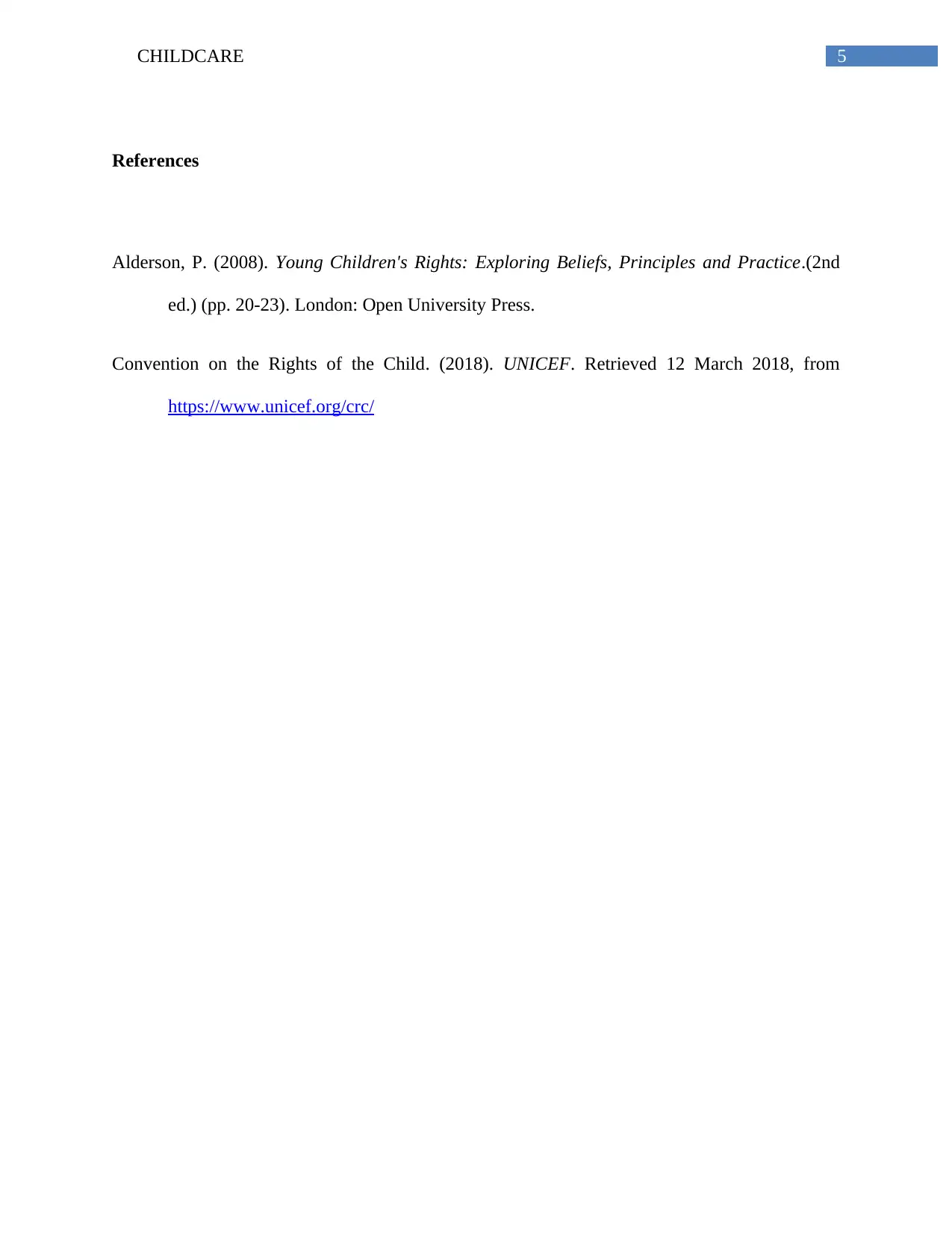
5CHILDCARE
References
Alderson, P. (2008). Young Children's Rights: Exploring Beliefs, Principles and Practice.(2nd
ed.) (pp. 20-23). London: Open University Press.
Convention on the Rights of the Child. (2018). UNICEF. Retrieved 12 March 2018, from
https://www.unicef.org/crc/
References
Alderson, P. (2008). Young Children's Rights: Exploring Beliefs, Principles and Practice.(2nd
ed.) (pp. 20-23). London: Open University Press.
Convention on the Rights of the Child. (2018). UNICEF. Retrieved 12 March 2018, from
https://www.unicef.org/crc/
⊘ This is a preview!⊘
Do you want full access?
Subscribe today to unlock all pages.

Trusted by 1+ million students worldwide
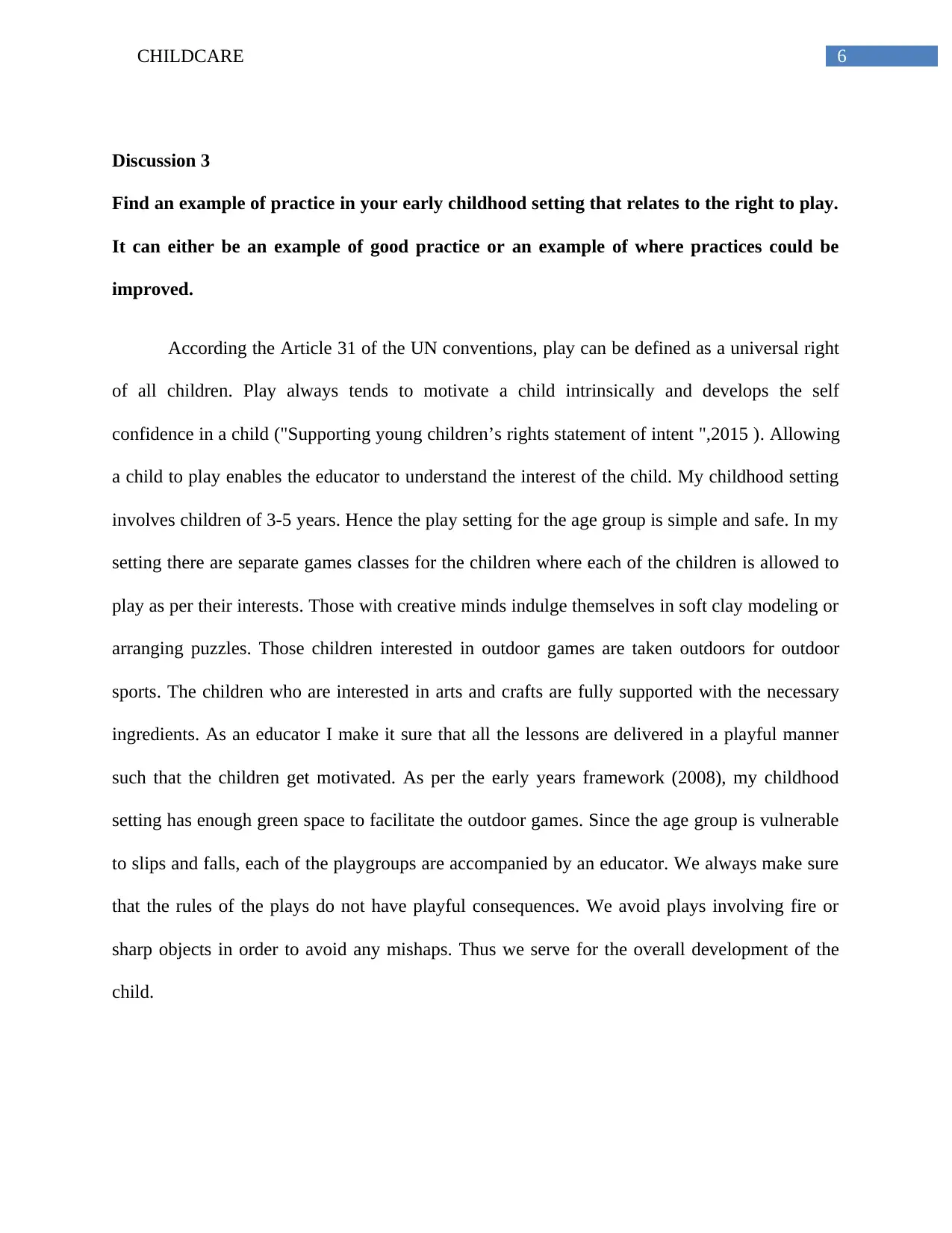
6CHILDCARE
Discussion 3
Find an example of practice in your early childhood setting that relates to the right to play.
It can either be an example of good practice or an example of where practices could be
improved.
According the Article 31 of the UN conventions, play can be defined as a universal right
of all children. Play always tends to motivate a child intrinsically and develops the self
confidence in a child ("Supporting young children’s rights statement of intent ",2015 ). Allowing
a child to play enables the educator to understand the interest of the child. My childhood setting
involves children of 3-5 years. Hence the play setting for the age group is simple and safe. In my
setting there are separate games classes for the children where each of the children is allowed to
play as per their interests. Those with creative minds indulge themselves in soft clay modeling or
arranging puzzles. Those children interested in outdoor games are taken outdoors for outdoor
sports. The children who are interested in arts and crafts are fully supported with the necessary
ingredients. As an educator I make it sure that all the lessons are delivered in a playful manner
such that the children get motivated. As per the early years framework (2008), my childhood
setting has enough green space to facilitate the outdoor games. Since the age group is vulnerable
to slips and falls, each of the playgroups are accompanied by an educator. We always make sure
that the rules of the plays do not have playful consequences. We avoid plays involving fire or
sharp objects in order to avoid any mishaps. Thus we serve for the overall development of the
child.
Discussion 3
Find an example of practice in your early childhood setting that relates to the right to play.
It can either be an example of good practice or an example of where practices could be
improved.
According the Article 31 of the UN conventions, play can be defined as a universal right
of all children. Play always tends to motivate a child intrinsically and develops the self
confidence in a child ("Supporting young children’s rights statement of intent ",2015 ). Allowing
a child to play enables the educator to understand the interest of the child. My childhood setting
involves children of 3-5 years. Hence the play setting for the age group is simple and safe. In my
setting there are separate games classes for the children where each of the children is allowed to
play as per their interests. Those with creative minds indulge themselves in soft clay modeling or
arranging puzzles. Those children interested in outdoor games are taken outdoors for outdoor
sports. The children who are interested in arts and crafts are fully supported with the necessary
ingredients. As an educator I make it sure that all the lessons are delivered in a playful manner
such that the children get motivated. As per the early years framework (2008), my childhood
setting has enough green space to facilitate the outdoor games. Since the age group is vulnerable
to slips and falls, each of the playgroups are accompanied by an educator. We always make sure
that the rules of the plays do not have playful consequences. We avoid plays involving fire or
sharp objects in order to avoid any mishaps. Thus we serve for the overall development of the
child.
Paraphrase This Document
Need a fresh take? Get an instant paraphrase of this document with our AI Paraphraser
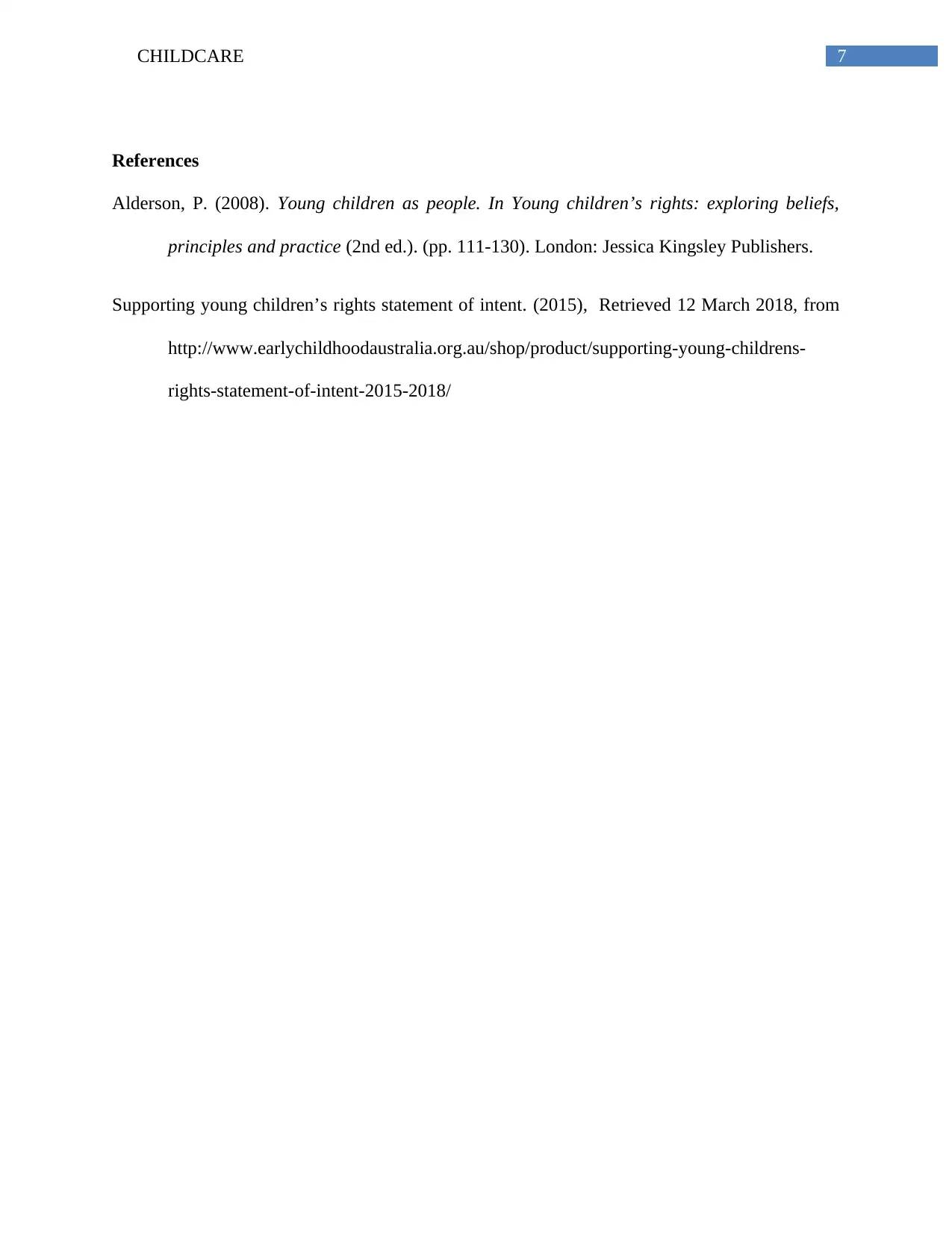
7CHILDCARE
References
Alderson, P. (2008). Young children as people. In Young children’s rights: exploring beliefs,
principles and practice (2nd ed.). (pp. 111-130). London: Jessica Kingsley Publishers.
Supporting young children’s rights statement of intent. (2015), Retrieved 12 March 2018, from
http://www.earlychildhoodaustralia.org.au/shop/product/supporting-young-childrens-
rights-statement-of-intent-2015-2018/
References
Alderson, P. (2008). Young children as people. In Young children’s rights: exploring beliefs,
principles and practice (2nd ed.). (pp. 111-130). London: Jessica Kingsley Publishers.
Supporting young children’s rights statement of intent. (2015), Retrieved 12 March 2018, from
http://www.earlychildhoodaustralia.org.au/shop/product/supporting-young-childrens-
rights-statement-of-intent-2015-2018/
1 out of 8
Related Documents
Your All-in-One AI-Powered Toolkit for Academic Success.
+13062052269
info@desklib.com
Available 24*7 on WhatsApp / Email
![[object Object]](/_next/static/media/star-bottom.7253800d.svg)
Unlock your academic potential
Copyright © 2020–2026 A2Z Services. All Rights Reserved. Developed and managed by ZUCOL.




